A three-day music festival welcomes tens of thousands of attendees… in a refugee camp
Tumaini Fest has taken place every year on the first weekend in November since 2014, bringing together artists and residents of the Dzaleka camp in Malawi with one goal in mind: to promote coexistence and combat xenophobia
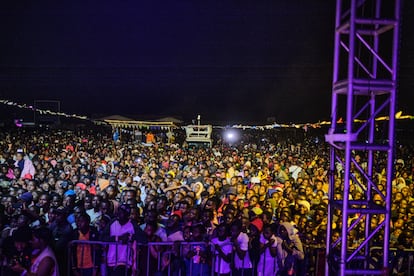
“One moment, my friend,” says Pendeza Luundo to a customer. His restaurant is full to overflowing and he looks overwhelmed, but he smiles as he lifts the lids of pots to show them the food: chicken stew, veal stew, squash greens with carrots, rice, beans… “I’ve worked Festival Tumaini since the first year. The economic benefit of three days of work is huge compared to the rest of the days of the year.” Luundo, a Congolese refugee, has spent 11 of his 40 years living in the Dzaleka refugee camp in Malawi, and he says that it’s not just the money that attracts him to the festival. “We live with a lot of stress and trauma, so when people from other places come, talk, dance and relate to us, we feel good psychologically. During Tumaini, no one is thinking about where you’re from. There is only happiness.”
Suddenly, there is a drum beat in the distance. A group of women in a circle dance, their bare feet covered in dust. You can hear the dancers’ footsteps on the stage, and the aroma of chapati (a bread of Indian origin) wafts into every corner of the camp. Children join the party, slipping between the legs of the audience, with blue butterflies painted on their faces: they’ve come straight from a project that uses art to work with young people’s mental health.
The seed of Tumaini Festival was planted in 2007, in Lubumbashi, Democratic Republic of the Congo. Poet and rapper Trésor Nzengu, better known as Menes la Plume, staged a public reading of a protest poem about his country’s tense situation. Days later, he began to receive threats and a few months later, decided to flee. In 2008, he arrived to Dzaleka, where he moved into an adobe hut and spent a few years “depressed, with no sense of the future and scared of becoming trapped in this situation,” he says. Menes never imagined that he would have to live like this, and certainly could not have guessed that years later, he would become Dzaleka’s first refugee rights advocate. His weapons: art and culture.
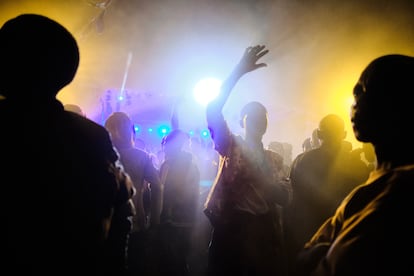
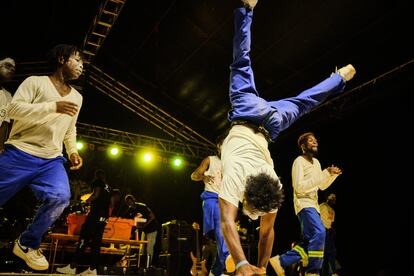
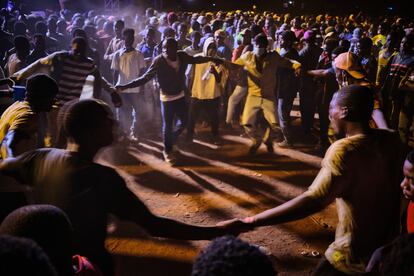
In 2012, Nzengu was walking through the camp listening to the echoes of a Somali song, seeing how the dust churned up from a young man’s dance steps lingered in the air, vibrating with the rhythm of a guitar plucking out a Congolese rumba… “I said to myself: I have to do something.” He got young people together and proposed that they create a cultural project through which they could express their art. So was born the Dzaleka Cultural Association, the embryo that later gave way to the non-profit organization Tumaini Letu. Two years later, with Menes la Plume at its helm, they organized the first edition of Tumaini Fest (in Swahili, “Festival of hope”), the association’s flagship project.
Throughout three days in November, the Tumaini spreads its wings across Dzaleka as an exceptional cultural event. The festival, which is free to attend, is currently Dzaleka’s primary source of commercial income and every year it helps the community to earn more than $150,000, according to the organization. It was founded in 2014 and in its eight previous editions (one was suspended due to the Covid-19 pandemic), 99,000 people have attended and more than 300 artists from Malawi, Africa, and the rest of the world have shared the stage with artists from Dzaleka. Musicians, dancers, poets, actors, acrobats, vendors, merchants, cooks, seamstresses… entire families multiply their earnings during the Tumaini, making the festival an essential event for the refugees, who receive a monthly payment of approximately 7,000 kwachas (less than $4.37) through the UNHCR, the U.N. Refugee Agency. 70% of the population of Malawi lives on less than $2.19 a day, according to 2019 data from the World Bank.
“Refugees miss fun”
During the festival, a few steps away from where the refugee camp’s Sowers Dance Crew jump and spin on the ground and in the air, there is silence in the Theater Corner. Divine appears on stage and tells her story: how she was abandoned by her mother when she was young, how she was infected with HIV as a minor after being raped, how she unknowingly passed it on to her boyfriend… “These things happen in Malawi, and we want to raise awareness among young people so that they do not happen again,” says Enokh Nyirenda, an actor with Rise Arts, a theater company created by Malawian students that has been coming to Tumaini for five years. “I love this festival, it’s different from the rest. I love that it’s multicultural, multitribal; collaborating, connecting, sharing food, talking, learning languages… learning from other people, basically,” he says. Gloria Kadammanja, lead actress, adds: “Refugees miss fun. During the Tumaini we laugh and celebrate together.”
The most awaited moment of the festival are the nighttime concerts. In this edition, Eli Njuchi unleashed the Friday madness with his hit Duwa (”flowers” in the Chichewa language), with thousands and thousands of hands pointing to the sky and the crowd singing in unison. Code Sangala filled the stage with love and dance and the band that performed with Lazarus Chigwandali, an albino artist, brought everyone to their feet with its local beats. The climax of Tumaini came courtesy of the Malawian artist Zeze Kingston, who kept its thousands of attendees in suspense until his appearance Saturday at midnight, and who closed out the three days of the festival in style.
The most important year
Since its first year in 2014, the Tumaini’s objective has been to promote peaceful coexistence, mutual understanding and intercultural harmony between refugees and their host community. But this year is, in the words of its founder, “the most significant edition of the festival.” The relocation order handed down by the Malawi government that forced thousands of self-sufficient refugees who lived outside the camp to come back to Dzaleka was criticized by international humanitarian organizations. Headlines of local newspapers spread xenophobic comments that had been made by members of the government, which portrayed the refugees as criminals to justify the order. “This year more than ever it is necessary to rebuild bridges to demonstrate that not everyone thinks like that, that there is more space for coexistence than for hate,” says Menes.
One of the people who were affected by the government’s relocation order is Mugisha Emmanuel, a 38-year-old man from the Democratic Republic of the Congo who arrived to Dzaleka in 2010. He says that one day he was in his store in Lilongwe, where he had lived for 10 years, when with no prior warning the police appeared, boarded him and five members of his family onto a truck and brought them directly to prison. “They forcibly took me and people robbed me of everything I had in the store. The police treated me like a criminal. I had to pay 100,000 kwachas (about $60) to get my sister and partner out,” he says with glassy eyes, seated at a plastic table in the food stand that he has set up for the festival.
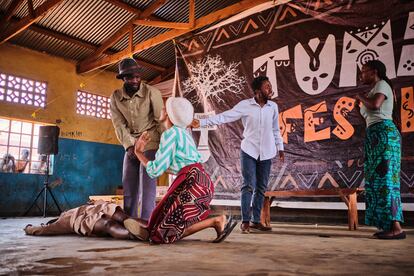
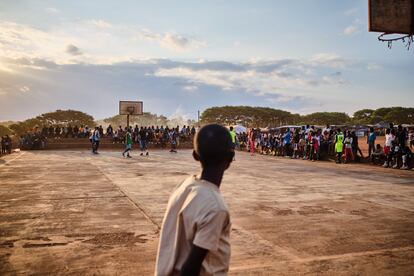
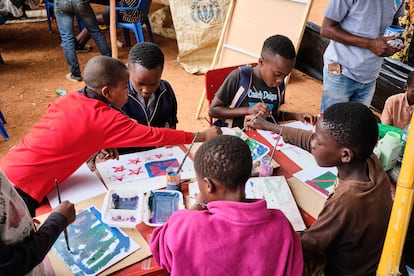
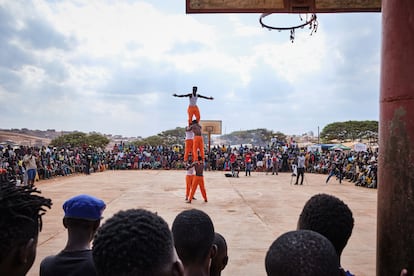
Built on the grounds of what was previously a prison by the same name, Dzaleka means “I won’t do it again” in Chichewa, Malawi’s national language. The camp opened its doors in 1994 to receive the thousands of refugees fleeing from genocide in Rwanda and Burundi, and its initial housing capacity of 12,000 has been vastly exceeded, with it now housing 52,000 people. Dzaleka challenges preconceived notions of a typical refugee camp filled with UNHCR tarpaulins. It’s more like a city, made of low-lying homes and ochre-colored clay, whose sandy streets house restaurants, markets, workshops, stores… a place refugees have inhabited and brought to life. “This festival has defied our expectations. We have felt very welcomed,” says Andrea Ciudad to this newspaper. The young Spaniard attended the event through the Tumaini Home Stay Program, staying with the family of Mercy Kabunda, a Congolese refugee.
From November 2 to 4, Dzaleka turned into a place of leisure and joy where Malawians, foreigners and refugees danced to the same song, ate the same bread and moved to the same rhythm. Menes la Plume is aware of what he has accomplished: “When people think about refugees, the first thing that comes to mind is getting them food or supplies, but no one thinks about their mental health, which is also essential. That is one of the gaps that the international community has not been able to fill, and the Tumaini is working specifically for and with this in mind.”
Sign up for our weekly newsletter to get more English-language news coverage from EL PAÍS USA Edition
Tu suscripción se está usando en otro dispositivo
¿Quieres añadir otro usuario a tu suscripción?
Si continúas leyendo en este dispositivo, no se podrá leer en el otro.
FlechaTu suscripción se está usando en otro dispositivo y solo puedes acceder a EL PAÍS desde un dispositivo a la vez.
Si quieres compartir tu cuenta, cambia tu suscripción a la modalidad Premium, así podrás añadir otro usuario. Cada uno accederá con su propia cuenta de email, lo que os permitirá personalizar vuestra experiencia en EL PAÍS.
¿Tienes una suscripción de empresa? Accede aquí para contratar más cuentas.
En el caso de no saber quién está usando tu cuenta, te recomendamos cambiar tu contraseña aquí.
Si decides continuar compartiendo tu cuenta, este mensaje se mostrará en tu dispositivo y en el de la otra persona que está usando tu cuenta de forma indefinida, afectando a tu experiencia de lectura. Puedes consultar aquí los términos y condiciones de la suscripción digital.








































